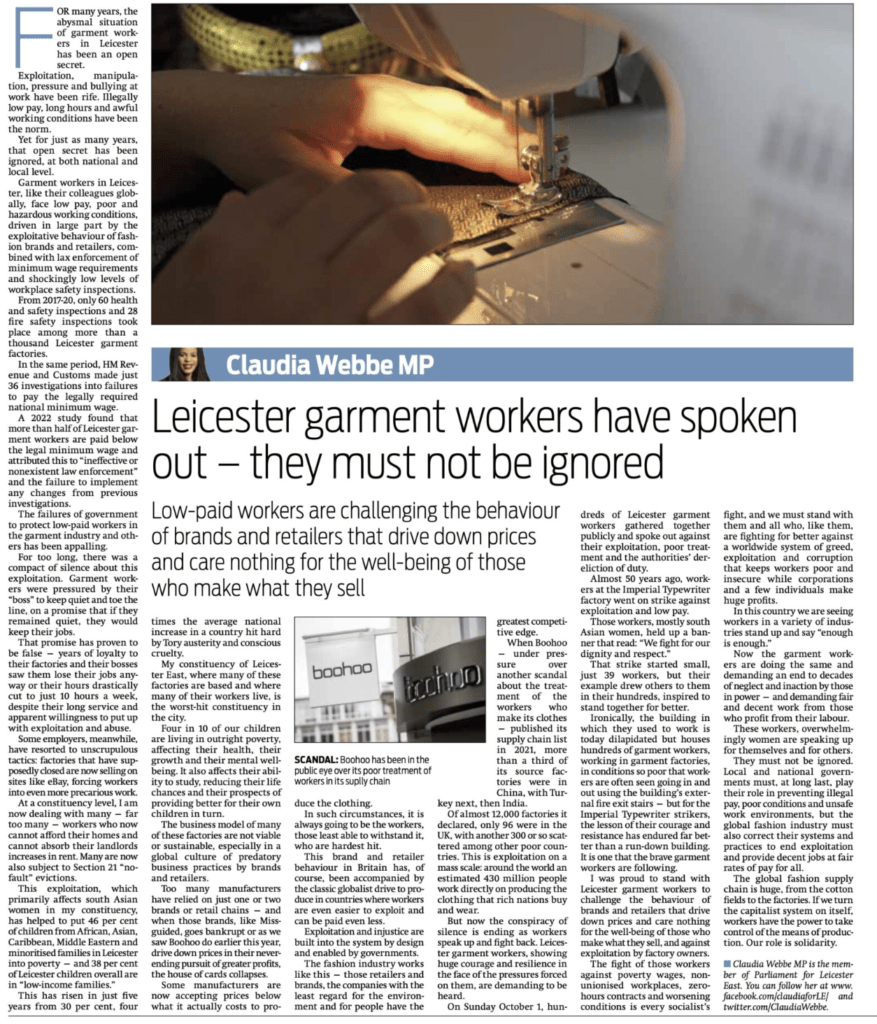
Leicester garment workers have spoken out – they must not be ignored
By Claudia Webbe MP
Low-paid workers are challenging the behaviour of brands and retailers that drive down prices and care nothing for the well-being of those who make what they sell, reports CLAUDIA WEBBE MP
FOR many years, the abysmal situation of garment workers in Leicester has been an open secret.
Exploitation, manipulation, pressure and bullying at work have been rife. Illegally low pay, long hours and awful working conditions have been the norm.
Yet for just as many years, that open secret has been ignored, at both national and local level.
Garment workers in Leicester, like their colleagues globally, face low pay, poor and hazardous working conditions, driven in large part by the exploitative behaviour of fashion brands and retailers, combined with lax enforcement of minimum wage requirements and shockingly low levels of workplace safety inspections.
From 2017-20, only 60 health and safety inspections and 28 fire safety inspections took place among more than a thousand Leicester garment factories.
In the same period, HM Revenue and Customs made just 36 investigations into failures to pay the legally required national minimum wage.
A 2022 study found that more than half of Leicester garment workers are paid below the legal minimum wage and attributed this to “ineffective or nonexistent law enforcement” and the failure to implement any changes from previous investigations.
The failures of government to protect low-paid workers in the garment industry and others has been appalling.
For too long, there was a compact of silence about this exploitation. Garment workers were pressured by their “boss” to keep quiet and toe the line, on a promise that if they remained quiet, they would keep their jobs.
That promise has proven to be false — years of loyalty to their factories and their bosses saw them lose their jobs anyway or their hours drastically cut to just 10 hours a week, despite their long service and apparent willingness to put up with exploitation and abuse.
Some employers, meanwhile, have resorted to unscrupulous tactics: factories that have supposedly closed are now selling on sites like eBay, forcing workers into even more precarious work.
At a constituency level, I am now dealing with many — far too many — workers who now cannot afford their homes and cannot absorb their landlords increases in rent. Many are now also subject to Section 21 “no-fault” evictions.
This exploitation, which primarily affects south Asian women in my constituency, has helped to put 46 per cent of children from African, Asian, Caribbean, Middle Eastern and minoritised families in Leicester into poverty — and 38 per cent of Leicester children overall are in “low-income families.”
This has risen in just five years from 30 per cent, four times the average national increase in a country hit hard by Tory austerity and conscious cruelty.
My constituency of Leicester East, where many of these factories are based and where many of their workers live, is the worst-hit constituency in the city.
Four in 10 of our children are living in outright poverty, affecting their health, their growth and their mental well-being. It also affects their ability to study, reducing their life chances and their prospects of providing better for their own children in turn.
The business model of many of these factories are not viable or sustainable, especially in a global culture of predatory business practices by brands and retailers.
Too many manufacturers have relied on just one or two brands or retail chains — and when those brands, like Missguided, goes bankrupt or as we saw Boohoo do earlier this year, drive down prices in their never-ending pursuit of greater profits, the house of cards collapses.
Some manufacturers are now accepting prices below what it actually costs to produce the clothing.
In such circumstances, it is always going to be the workers, those least able to withstand it, who are hardest hit.
This brand and retailer behaviour in Britain has, of course, been accompanied by the classic globalist drive to produce in countries where workers are even easier to exploit and can be paid even less.
Exploitation and injustice are built into the system by design and enabled by governments.
The fashion industry works like this — those retailers and brands, the companies with the least regard for the environment and for people have the greatest competitive edge.
When Boohoo — under pressure over another scandal about the treatment of the workers who make its clothes — published its supply chain list in 2021, more than a third of its source factories were in China, with Turkey next, then India.
Of almost 12,000 factories it declared, only 96 were in the UK, with another 300 or so scattered among other poor countries. This is exploitation on a mass scale: around the world an estimated 430 million people work directly on producing the clothing that rich nations buy and wear.
But now the conspiracy of silence is ending as workers speak up and fight back. Leicester garment workers, showing huge courage and resilience in the face of the pressures forced on them, are demanding to be heard.
On Sunday October 1, hundreds of Leicester garment workers gathered together publicly and spoke out against their exploitation, poor treatment and the authorities’ dereliction of duty.
Almost 50 years ago, workers at the Imperial Typewriter factory went on strike against exploitation and low pay.
Those workers, mostly south Asian women, held up a banner that read: “We fight for our dignity and respect.”
That strike started small, just 39 workers, but their example drew others to them in their hundreds, inspired to stand together for better.
Ironically, the building in which they used to work is today dilapidated but houses hundreds of garment workers, working in garment factories, in conditions so poor that workers are often seen going in and out using the building’s external fire exit stairs — but for the Imperial Typewriter strikers, the lesson of their courage and resistance has endured far better than a run-down building. It is one that the brave garment workers are following.
I was proud to stand with Leicester garment workers to challenge the behaviour of brands and retailers that drive down prices and care nothing for the well-being of those who make what they sell, and against exploitation by factory owners.
The fight of those workers against poverty wages, non-unionised workplaces, zero-hours contracts and worsening conditions is every socialist’s fight, and we must stand with them and all who, like them, are fighting for better against a worldwide system of greed, exploitation and corruption that keeps workers poor and insecure while corporations and a few individuals make huge profits.
In this country we are seeing workers in a variety of industries stand up and say “enough is enough.”
Now the garment workers are doing the same and demanding an end to decades of neglect and inaction by those in power — and demanding fair and decent work from those who profit from their labour.
These workers, overwhelmingly women are speaking up for themselves and for others.
They must not be ignored. Local and national governments must, at long last, play their role in preventing illegal pay, poor conditions and unsafe work environments, but the global fashion industry must also correct their systems and practices to end exploitation and provide decent jobs at fair rates of pay for all.
The global fashion supply chain is huge, from the cotton fields to the factories. If we turn the capitalist system on itself, workers have the power to take control of the means of production. Our role is solidarity.
Claudia Webbe MP is the member of Parliament for Leicester East. You can follow her at www.facebook.com/claudiaforLE and twitter.com/ClaudiaWebbe


